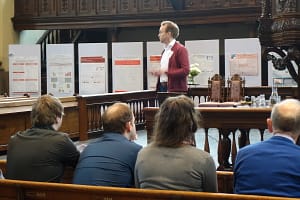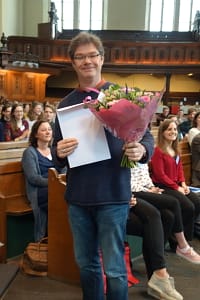
The 2018 Heymans Symposium: A Successful Afternoon of Science
Once a year, researchers from the Heymans Institute gather in the beautiful Nieuwe Kerk in Groningen for an afternoon of science at the Heymans Symposium. (The Heymans Insitute is the cool pseudonym of the Department of Psychology at the RUG.) For students, this is an opportunity to see what their teachers are up to when they’re not teaching. For researchers, this is an opportunity for cross-pollination between the different sub-units within the department.
After a brief introduction by the hosts, Tassos Sarampalis and Nadine Schlichting, the symposium kicked off with a keynote lecture in which Hedderik van Rijn discussed his work on Slim Stampen. Slim Stampen is a form of adaptive fact learning; that is, it’s a learning algorithm that estimates how well a student knows a set of facts, and then repeats only those facts that can do with a little repetition. By skipping easy facts and repeating hard facts, Slim Stampen allows students to learn facts more quickly.
Hedderik is not only a great speaker (and the department’s teacher of the year!), but his lecture also demonstrated how simple ideas, when backed up by solid evidence, can have a real impact, in this case in schools.
The symposium then continued with a prize for the best blog published on Mindwise in 2017. The winner was Eric Rietzschel for his blogpost The Creativity of Covfefe, which you should go and read right now. Eric delivered a passionate thank-you speech in which he first reminisced about winning second place in some contest when he was a child. “And now this!”
Next up was the Snijder-Kouwer prize for the best article written as first author by a PhD student. This year’s winner was Michael J. Wolff (not to be confused with Michael J. Fox) for his article about ‘pinging the brain’. In a nutshell, Michael first showed (as others have before) that you can decode from EEG whether participants keep a rightward or leftward tilted grating in working memory. However, it was so far believed that you can only decode working-memory content for a short moment after the memory stimulus has been presented. But Michael found that you can re-instate decoding performance by presenting a task-irrelevant “probe” stimulus. This probe triggers renewed brain activity that—remarkably—contains information about the content of visual working memory.
Sounds complicated? It is indeed a little complicated, but if you’re interested (and you should be!) then take a look at this talk that Elkan Akyürek (Michael’s PhD supervisor) gave at last year’s Heymans Symposium. In it, he explains the study in accessible terms.
Michael wasn’t in Groningen to accept his prize in person, but he skyped in to say hello and tell us a bit more about his research.
Next up there were five short talks by researchers from the Heymans Institute: Casper Albers, Barbara Wisse, Yannick Hill, Yannick Boddez, and Sara Fabbri. These talks have all been recorded and will be posted on YouTube later. So rather than trying to do them all justice, I’ll refer you to our channel!
Then, because we’ve made a solemn pledge that no Heymans Symposium can be over until almost everyone has received a prize, we continued with the poster prize. (Did I mention there was a poster session?) This went to Yannick Hill (who also gave a talk) for his work on resilience, or the ability to bounce back after setbacks. Let’s see how he copes if he doesn’t win a prize next year.
The day ended with mini collaboration grants, a new concept that we introduced this year. These are small (€2000) grants for starting a collaboration between two or more researchers from different units within the department. No fewer than two grants were handed out: one to Wisnu Wiradhany and Jeremy Burman for developing a technique to visualize connections between researchers; and one to Minita Franzen and Susanne Scheibe who will examine adult forms of bullying and victimisation in early career stages.
In sum, it was an altogether successful afternoon of science. It’s events like this that make the Department of Psychology at the RUG such as a pleasant and inspiring place to work!







